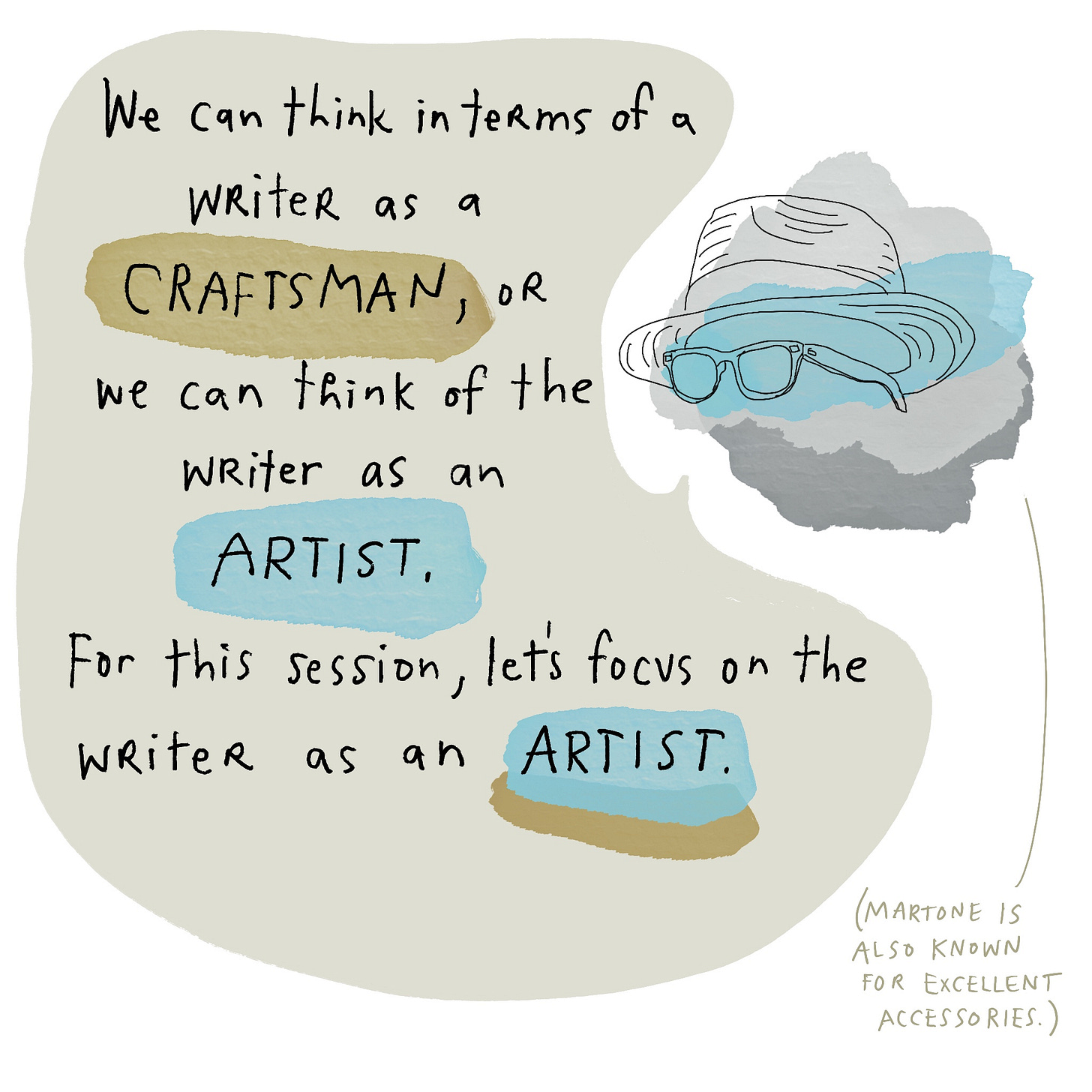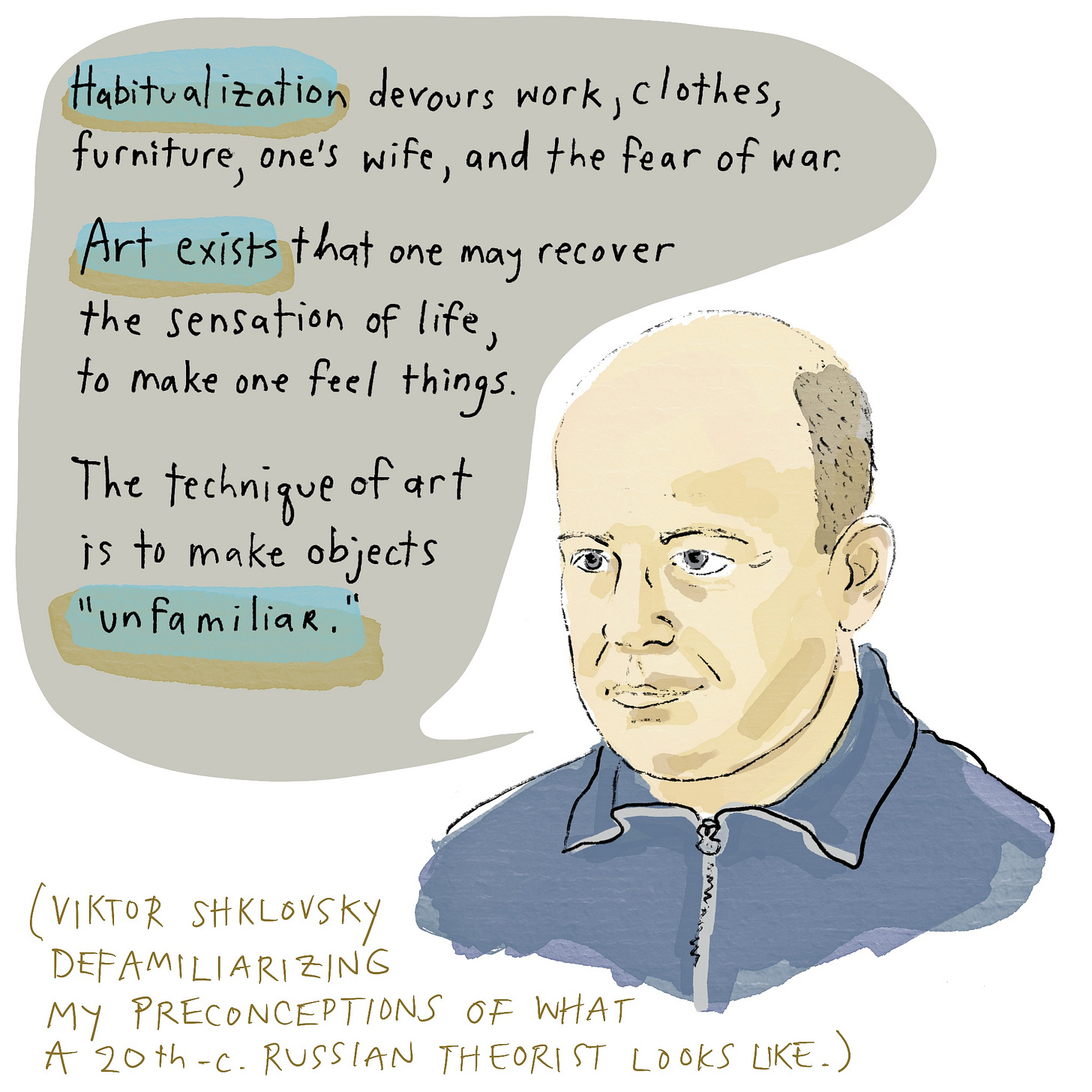Dear Reader,
I love being on faculty at writers’ conferences because it means I can also be a student. A few weeks ago, I was part of the faculty at the Midwest Writers Workshop conference, where I attended a session led by the brilliant writer, pen-pal, and train-lover—who, it must be said, has unfairly excellent hair—Michael Martone.
Martone opened his session by asking:
“To entertain,” one person said. “To persuade,” said another. “To tell a good story.”
Martone held up his hand. “Hang on,” he said:
Now he got some different responses: “To help people see the world differently.” “To make people feel.” “To imagine new possibilities.”
Yes, now we were getting it.
I should mention that when we walked into the room, the chairs that had been in a half-dozen rows for all the other sessions were moved around in a jumble. Some facing inward, others facing the wall. We were sitting in chairs facing every which way. Martone had opened the session by leaning back against the wall and saying: “Two households, both alike in dignity,/In fair Verona, where we lay our scene,” and proceeded to quote the entire prologue of Romeo and Juliet from memory. “The which if you with patient ears attend,/What here shall miss, our toil shall strive to mend.”
“Yes,” Martone said after we’d offered our thoughts. “The job of the writer is to defamiliarize.”
This was actually the title of his session: Defamiliarization.
I had been excited about the session because I knew a little about the topic, like that the word was coined by the Russian theorist Viktor Shklovsky in 1917: ostranenie, which is also translated as estrangement. Shklovsky argued that artists use poetic language (as opposed to common prose) to slow down and challenge our perceptions, which have been deadened by repetition and over-familiarization. I love this idea and even wrote about defamiliarization in my own tenure file as central to my teaching of aspiring writers. I quoted Shklovsky:
But for all my quoting and talking about it in class, I don’t think I ever really created AN EXPERIENCE of defamiliarization in the classroom. Martone did.
He had us send an out-of-context text to someone we knew, then asked where we sent it: “Albuquerque?!?! You just sent words from Indiana to Albuquerque?!?! In seconds!!! And you got a response?!?!”
We all laughed. We’d forgotten how marvelous it is to send and receive texts.
He gave us his number and had us all text him at the same time.
He quoted Basho’s haiku: Old pond / frogs jumped in / sound of water.
The texts sounded like frogs jumping in water.
Finally, he pointed out a participant’s cable-knit sweater. He asked if we knew that these sweaters originated in the Aran Islands off the coast of Ireland? That they can absorb a great deal of water before feeling wet, making them perfect for fishermen? He asked if we knew why they all had different stitching patterns. Did we know that it was to help identify a drowned sailor if his face was unrecognizable?
We did not.
Did we know the poem “The Sweater” by Gregory Orr?
I will lose you.
It is written into this poem
the way the fisherman’s wife
knits his death into the sweater.
Did we see how Orr defamiliarized a fisherman’s sweater?
How he defamiliarized the fear of loss?
We did, we did.









obviously for this moment:
What fun.
http://ericlemay.org/defam.html
Thanks for the post,
Kelcey!
I made this a long time ago,
And here's a share.
Fascinating!